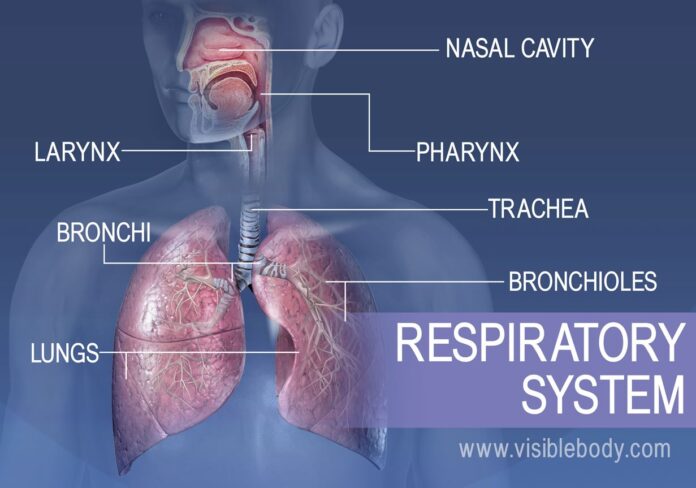RESPIRATORY SYSTEM
The respiratory system is the network of organs and tissues that help you breathe. It includes your airways, lungs and blood vessels. The muscles that power your lungs are also part of the respiratory system. These parts work together to move oxygen throughout the body and clean out waste gases like carbon dioxide
SIGNS OF RESPIRATORY DISEASE
The respiratory system is the network of organs and tissues that help you breathe. It includes your airways, lungs and blood vessels. The muscles that power your lungs are also part of the respiratory system. These parts work together to move oxygen throughout the body and clean out waste gases like carbon dioxide.
10 TIPS TO KEEP YOUR RESPIRATORY SYSTEM HEALTHY
1. Don’t smoke or stop smoking
You probably already know that smoking increases your risk of lung cancer. But that’s not the only disease it can cause.
Smoking is linked to most lung diseases, including COPD, idiopathic pulmonary fibrosis, and asthma. It also makes those diseases more severe. For example, those who smoke are 12 to 13 times
People are more likely to die from COPD than nonsmokers.
In addition, smoking causes about 90% of all lung cancer deaths in men and women. More women die from lung cancer each year than from breast cancer.
2. Exercise to breathe harder
Besides avoiding cigarettes, getting regular exercise is probably the most important thing you can do for the health of your lungs. Just as exercise keeps your body in shape, it keeps your lungs in shape, too.
When you exercise, your heart beats faster, and your lungs work harder. Your body needs more oxygen to fuel your muscles. Your lungs step up their activity to deliver that oxygen while expelling additional carbon dioxide.
According to a 2016 article, during exercise, your breathing increases from about 15 times a minute to about 40 to 60 times a minute
. That’s why it’s important to regularly do aerobic exercise that gets you breathing hard.
This type of exercise provides the best workout for your lungs. The muscles between your ribs expand and contract, and the air sacs inside your lungs work quickly to exchange oxygen for carbon dioxide. The more you exercise, the more efficient your lungs become.
Creating strong, healthy lungs through exercise helps you to better resist aging and disease. Even if you do develop lung disease down the road, exercise helps to slow the progression and keeps you active longer.
3. Avoid exposure to pollutants
Exposure to pollutants in the air can damage your lungs and accelerate aging. When they’re young and strong, your lungs can easily resist these toxins. As you age, though, they lose some of that resistance and become more vulnerable to infections and disease.
Give your lungs a break. Reduce your exposure as much as you can by:
- avoiding secondhand smoke, and trying not to go outside during peak air pollution times
- avoiding exercise near heavy traffic, as you can inhale the exhaust
- minimize exposure to airborne pollutants at work, such as in construction, mining, and waste management, by taking take all possible safety precautions
4. Prevent infections
Infections can be particularly dangerous for your lungs, especially as you age. Those with lung diseases like COPD are particularly at risk for infection, also known as pneumonia. Even healthy seniors can easily develop pneumonia if they’re not careful.
The best way to avoid lung infections is to keep your hands clean. Wash regularly with warm water and soap, and avoid touching your face as much as possible.
Drink plenty of water and eat lots of fruits and vegetables, as they contain nutrients that help boost your immune system.
Stay up-to-date with your vaccinations. Get a flu shot each year, and if you’re 65 or older, get a pneumonia vaccination as well. In addition, stay up-to-date with required booster shots for COVID-19.
If you’re like many people, you take shallow breaths from your chest area using only a small portion of your lungs. Deep breathing helps clear the lungs and creates a full oxygen exchange.
Measurements 4 weeks after the start of the study showed improved lung function, which significantly reduced after the final two weeks.
The ALA agrees with these findings: Breathing exercises can make your lungs more efficient.
To try it yourself, sit somewhere quiet and slowly breathe through your nose alone. Then, breathe out at least twice as long through your mouth. It may help to count your breaths. For example, as you inhale, count 1-2-3-4. Then as you exhale, count 1-2-3-4-5-6-7-8.
BEST DOCTORS FOR RESPIRATORY DISEASE IN ALLAHABAD
. DR MOHD FAROOQ (Ideal hospital )
.DR V.K AGARWAL (Shakuntala hospital)
. DR GAURAV AGARWAL (Holistic chest care hospital)

































